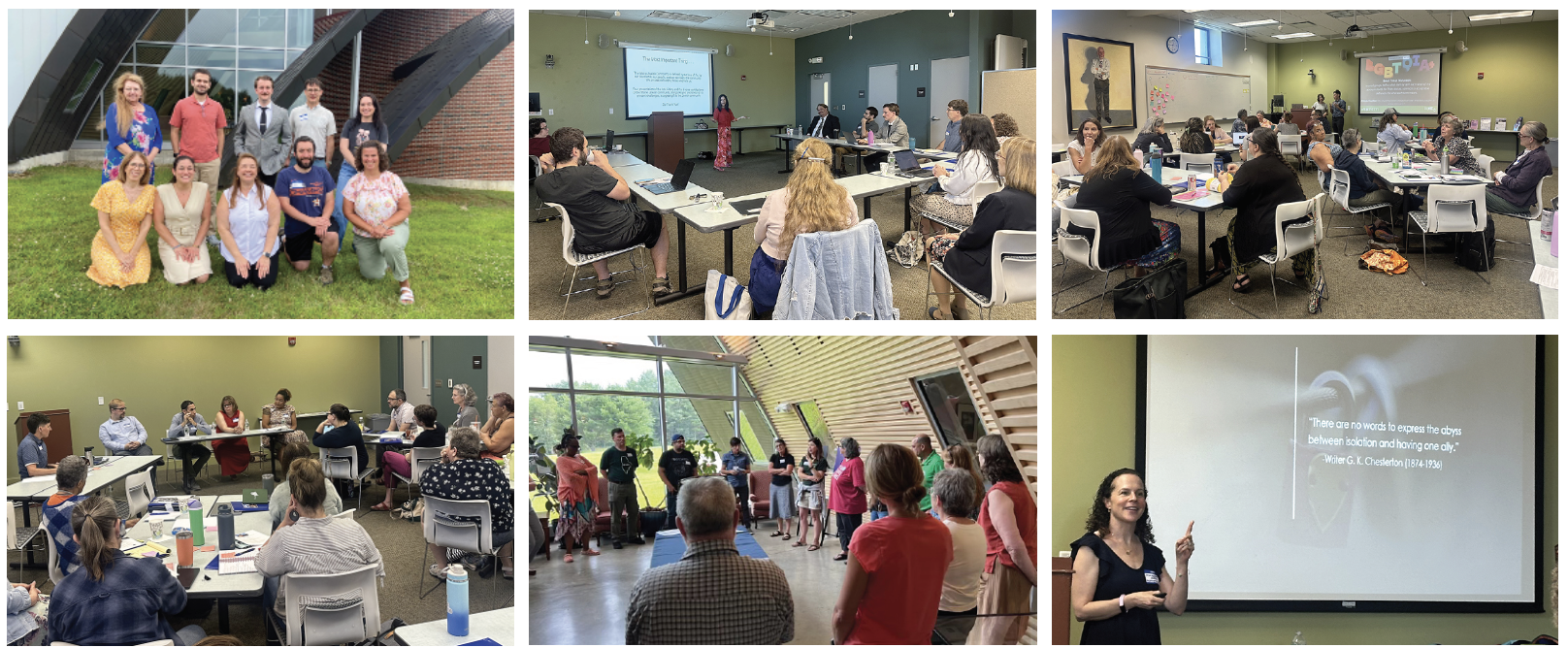2025 Summer Seminars
Teaching the Holocaust
The seminar will cover a wide variety of topics to help teachers understand not just the events of the Holocaust, but the wider context that allowed it to happen. The seminar will provide teachers with information, resources, and activities that can be used in history, social studies, government, civics, and literature classes. Participants can receive 12 continuing education credits upon completion of the seminar.
Sessions
“Echoes of the Past, Voices of the Future: Antisemitism and the Maine Jewish Community” by the Maine Jewish Museum ED Dawn LaRochelle and Rabbi Bill Siemers.
“The Foundations of Nazi Antisemitism”
“Using Literature in the Holocaust Classroom” by author Anna Salton Eisen
“Jan Karski and Bearing Witness” by Clark Young, screenwriter of the film “Remember This” shown on PBS
“Dismantling Democracy”
“Using Artifacts in the Holocaust Classroom”
“Introduction to the Holocaust”
“Liberation and the Aftermath: Soldiers and Survivors” by Noel March, Director of the Maine Community Policing Institute
“Justice and Accountability after the Holocaust”
Building Supportive Schools
This two-day seminar will equip you with the knowledge and tools to challenge racism, antisemitism, and anti-LGBTQ+ hate in your school. Through discussions, insights from teachers and community leaders, and workshops, you’ll gain strategies to foster a safer, more supportive learning environment. Participants can earn 14 continuing education credits upon full completion of the seminar.
Sessions
“Preparing to Respond to School-Based Bias Incidents: Guidelines and Resources“ with the ADL-New England
“LGBTQ+ and Gender 101” with EqualityMaine
“Exploring Everyday Effects of Racism” with Dr. Idella Glenn from USM
“Allyship in Action” with Mandy Levine from Mandy Levine Consulting
Antisemitism in Maine with representatives from the Maine Jewish community
There will also be a teacher panel on bias in the classroom
These seminars are free of charge and offer educators two days of professional presentations, in-depth conversation, resources, and CEUs.
Participants Feedback from 2025
Teaching the Holocaust
Great seminar and I wish more people would attend. I would love to convince my peers to attend.
It has been immensely valuable to learn, reflect, and discuss aspects of Holocaust history that I hadn't known nearly as well prior to these sessions. I am eager to spread the word to colleagues at my school about the power and usefulness of this experience.
This is integral for all educators
This seminar helped me to develop a deeper understanding of the Holocaust and the history of the Jewish people.
I think it was certainly worth my time. I usually do not enjoy conferences, but I enjoyed this conference and feel I learned a lot from it.
This seminar was invaluable for me as a teacher that is new to the profession. I cannot adequately express how beneficial it has been to build these connections and learn from the folks at the HHRC for my own teaching practice and planning. My students in southern Maine will absolutely benefit in their learning about the Holocaust going forward because of the accessibility of this opportunity.
Building Supportive School
This work was so impactful and inspiring - it was amazing to work with this group of experts and to build on my own knowledge and tools!
The most valuable PD I have had in years and it feels like there is so much more to unpack and explore.
Wonderful training, chock full of information and ideas. I’ve been doing this work in my district for 15 years and I feel refreshed and ready to keep going. That’s so very valuable.
Thank you so much for offering this for free. Economic inequality and the barriers it creates are very real.
This work brings us all together so that we can be our best selves and bring a human education to our students. Without the human element we will not conquer hate.
Donor support allowed me to attend this training. Thank you for making this training accessible and available to all.
Being able to attend this for free made the difference in being a part of this or not. This has been the most impactful training I've ever had as a teacher and I've been teaching for decades. I feel empowered, supported, and hopeful.
Listening to ideas of the variety of people who attend these summer workshops, hearing thoughts of strangers, is so valuable for me. I love the people I work with, but it is constructive to be with a new group of adults. I feel connected to so many of these people as they share their viewpoints.
lots of experts in one place, digestible and action-focused information, a host of resources, and ongoing collaboration opportunities - one of the best professional learning experiences in a long time!
This is a seminar that EVERYONE in education should participate in. It is universal because it meets people where they are in their journey and supportively invites them to take a few more steps, without shaming them for where they currently are.
It was awesome to be in a room full of people who care and who are working on doing good things for our students.
I appreciate this opportunity so much
Seminar was invaluable for folks across the political spectrum
This seminar was invaluable to me as an educator, as I was given new tools and information, but also connection to communities that I did not know existed, and connection to a community that offered support and understanding where I don't always find in my professional community.
This seminar was incredibly moving and educational. I learned so much and was reminded of things I needed to be nudged about.

